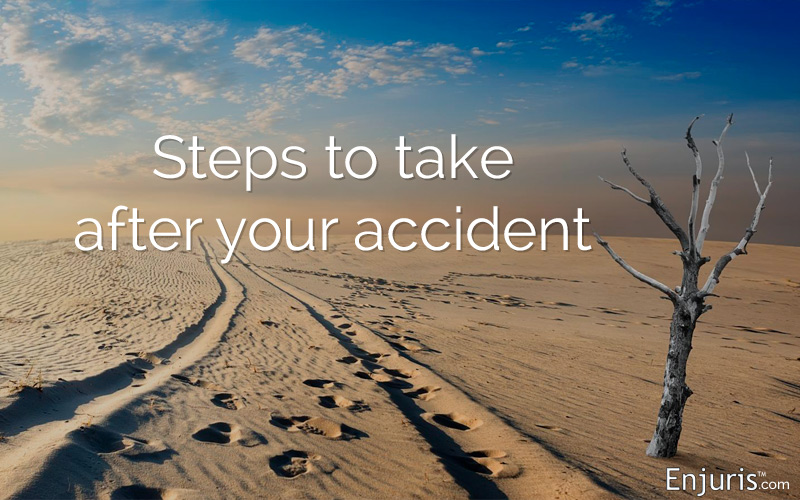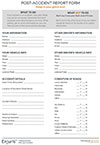
Guide to critical steps to take immediately following an automobile accident
A car accident is a traumatic event. Following a crash, there may be a number of emotions running through your head and it can be difficult to focus on the things you need to do. That’s why we’ve distilled the actions you should take following a car accident in Arizona into 10 essential steps.
Consider printing out this article and putting it in the glove compartment or glovebox of your car so that you have the information at your fingertips in the unfortunate event that you’re involved in a wreck.
Step 1: Stop your vehicle
Leaving an accident is a common impulse. You may fear retaliation from the other driver or you may believe there was no damage done in the accident. Regardless of the reason, leaving the scene of an accident without stopping and exchanging information with the other driver (or leaving a clearly visible note with your contact information if the car you struck was unoccupied) is against the law in Arizona.
Penalties for a hit and run are significant, ranging from 30 days in jail to more than 12 years in jail.
Step 2: Provide aid to anyone injured (including yourself)
Helping someone who’s hurt after a car accident is not only the right thing to do, it’s also the law in Arizona. Title 28, Section 661 of the Arizona Revised Statutes requires drivers who are involved in an injury-causing accident to render “reasonable assistance” and/or help coordinate medical transportation.
Step 3: Call the police
It’s important to call the police, even after a minor car accident. In cases involving injuries or property damage, the responding police officer will prepare a police report. This report will be very important for any future insurance claim or lawsuit.
Be honest and tell the police officer the truth, including anything that might help your case, so that the officer can include the information in the report. For example, if the accident occurred at night and the other driver had their headlights turned off, you’ll want to make sure the police officer is aware of that fact.
Step 4: Exchange information with the other driver
Arizona law requires that you exchange the following information with the other driver:
- Driver’s name
- Driver’s address
- Driver’s license
- Vehicle registration number
Obtaining this information will also be important if you intend to pursue compensation for your damages.
Be sure to ask the other driver to see the documents from which you can obtain the above information (e.g., driver’s license). Drivers who don’t have insurance will often lie about their name and address, so you’ll want to be able to verify the information yourself. There’s also a chance the driver will leave the scene before the police arrive, so don’t assume the police will be able to get this information.
Step 5: Collect witness statements and information
Potential witnesses to an automobile accident include:
- Pedestrians
- Drivers and passengers in other vehicles
- People in adjacent buildings
- Emergency responders
Witnesses are notoriously difficult to track down after an accident. Be sure to get all the contact information you can at the time of the accident, including:
- Home and work addresses
- Home and work telephone numbers
- Telephone numbers of someone close to the witnesses (such as a spouse)
Step 6: Seek medical attention
Your health should be your top priority. If you’re injured in a car accident, you’ll want to seek medical attention as soon as possible.
But there’s another reason for seeking medical attention. Going to the doctor adds legitimacy to any future damage claim you make. If you don’t visit a doctor soon after the accident, the other party will argue that:
- You weren’t really hurt in the accident, or
- Your failure to seek medical help right away exacerbated or prolonged your injuries, and your damages should be reduced according.
Step 7: Notify your insurer
Even if the accident wasn’t your fault, you’ll want to check your policy and contact your insurance provider at some point after the accident. Have the other driver’s information ready so that you can provide it to your insurer.
Step 8: Document everything
If you seek damages, you can expect some pushback from the other side. The best way to ensure you receive the compensation you deserve is to keep detailed records. This includes:
- Bills and receipts for medical treatment
- A journal documenting your pain and suffering
- A list of the hours of work you miss as a result of the accident
- Photographs of any property damage and physical injuries
 Accident Report Form
Accident Report Form
Sample post-accident report form to keep in your glove box - fill out at the scene or as soon as you can after a car accident
Download in PDF format![]()
 Post-Accident Journal Form
Post-Accident Journal Form
Sample accident journal/diary to help you document the effect on your daily life
Download in PDF format![]()
Step 9: Be cautious on calls with insurance adjuster
As soon as the day after an accident, you can expect a call from the insurance adjuster for the other driver.
A common tactic when the other driver is at fault is for the adjuster to offer a quick settlement. A quick settlement for a serious car accident is usually a mistake. If it’s soon after the accident, you likely have no way of knowing just how serious your injuries are. The mild pain you’re experiencing now may be permanent or may progress into something more serious down the road.
If you accept a settlement early on, you won’t be able to sue for more damages later, even if you ultimately discover that there are more damages than you initially thought.
When the adjuster first calls, make it clear that you want them to communicate to you in writing. Then inform the adjuster that you will need to determine the full value of your injuries before discussing a settlement and that you will communicate this amount through a demand letter when the time is appropriate.
Step 10: Talk with an attorney as soon as possible
If you’re involved in more than just a minor accident or are having issues receiving sufficient compensation for your injuries from an insurance company, consider hiring an experienced Arizona personal injury attorney. An experienced attorney can deal with the insurance company and help maximize your recovery.
If you’re still on the fence about contacting an attorney, consider the following:
- Most personal injury attorneys work on contingency basis (usually 1/3 of the damages awarded). This means you don’t pay anything unless you recover damages.
- Most personal injury attorneys offer free initial consultations where they can help you determine whether you have a case worth pursuing.
See our guide Choosing a personal injury attorney.
